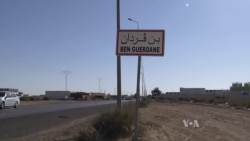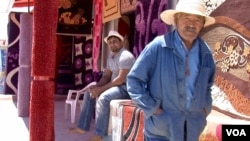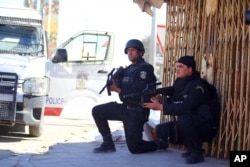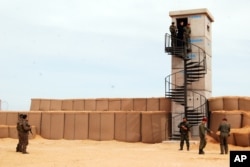The outdoor market should be packed, but just a few people have braved a hot sun to haggle over flat-screen TVs and gaudy rugs trucked over from Libya, just 30 kilometers away.
There is also no business at Ben Guerdane’s currency black market; the men manning the dusty sidewalk stalls shoo a visitor away with a surly wave.
One of Tunisia’s poorest towns, Ben Guerdane is largely dependent on cross-border trade — legal and illegal — for its survival. Already struggling businesses faced a fresh blow a few weeks ago, when Libyan authorities temporarily closed the frontier to stop the flow of smuggled oil.
There is an even larger cause for worry. Tunisian authorities have closed their side of the border at least twice since last November to crack down on two other exports: jihadi fighters and weapons. Earlier this year, they completed the first part of a 200-kilometer border fence with Libya to help thwart terrorism.
But the threat also comes from within. This tumbledown, neglected town of 80,000 has long been a breeding ground for foreign fighters that have joined Islamist insurgencies in Afghanistan, the Middle East and, more recently, in neighboring Libya.
After the revolution
Ben Guerdane illustrates the darker fallout of Tunisia’s 2011 revolution: deepening poverty and unemployment, fading hopes and rising insecurity. Apart from trade, there is no industry here to speak of, no signs of economic development, although authorities promise change.
“People have been abandoned,” says Abdelbasset Abdelmoumen, who lost his job as a geography teacher a few years ago. “The state has never taken responsibility; it’s never found solutions here.”
As he waits for customers at the town’s outdoor market, trader Choukri Yahia reminisces about the heady days five years ago, when Tunisians and Libyans overthrew their respective dictators.
“We thought life would be better after the revolutions,” says Yahia, who sells embroidered gowns and hair bands. ‘At least, that’s what we hoped.”
When Libya’s civil war broke out in March 2011 — just two months after Tunisia’s revolution — Ben Guardene residents handed out sandwiches and soft drinks to refugees streaming across the border.
But things quickly soured. Libya’s uprising also drove home tens of thousands of Tunisian migrant workers, drying up precious remittances as the Tunisian economy foundered. Instability in both countries has since delivered a new set of problems.
In March, Islamic State fighters crossed the border from Libya to attack Ben Guerdane, several dozen dying in the assault. Residents identified some as former neighbours and classmates. Overall, up to 7,000 Tunisians have joined jihadist groups in North Africa and the Middle East, experts estimate. Ben Guerdane is considered a top supplier.
“The tradition of jihad is so strong in Ben Guerdane,” wrote risk analysis firm The Soufan Group, “that al-Qaeda in Iraq’s former leader Abu Musab al-Zarqawi, allegedly said, 'If Ben Gardane had been located next to Fallujah, we would have liberated Iraq.'”
'They hate this life'
Soaring unemployment in Ben Guardene — as high as 50 percent by some estimates — has left men like Abdelmoumen, who has a master’s degree, idling in cafes.
“There’s been no fixed idea about how to integrate young people, to give them work,” he says.
Yet many agree that joblessness is not the only factor breeding Tunisia’s jihadis. Nor can Ben Guerdane be dismissed as a jihadi factory. Many residents here are proud of fighting the Islamists in March.
A report by the Carnegie Foundation cites a mix of reasons nurturing Tunisia's extremism, including a post-revolutionary vacuum that has allowed radical groups to flourish, and a failure by the moderate Islamist Ennahda party to balance religion and politics.
“These youngsters are searching for identity,” says Faycal Dchicha, who runs a development group that works with youth in Ben Guerdane and other area towns. “They want to be recognized and valued.”
Sitting at an outside cafe with friends, 30-year-old Mohamed Jbara, an unemployed software engineer, offers his own list of reasons.
"Number one is money, number two is they hate this life, and number three is Daesch manipulates people,” he says, using the Arabic term for Islamic State.
He describes how a handful of former friends have left to join insurgency groups.
“You stop seeing them at the cafe, then after a few months you hear they have left for Syria and Iraq,” he says.
He views his own future as bleak, but he rules out joining them.
“We have maybe 20 percent more democracy now, but no jobs,”Jbara says. “Life is harder now than before the revolution.”








